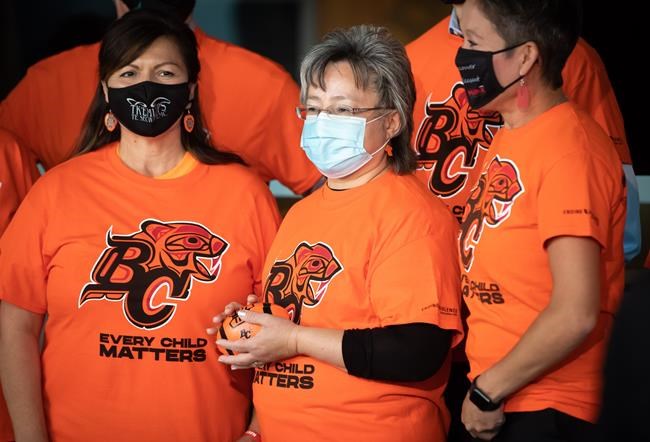B.C. Lions to mark National Day for Truth and Reconciliation at Sept. 24 game
Advertisement
Read this article for free:
or
Already have an account? Log in here »
To continue reading, please subscribe:
Monthly Digital Subscription
$0 for the first 4 weeks*
- Enjoy unlimited reading on winnipegfreepress.com
- Read the E-Edition, our digital replica newspaper
- Access News Break, our award-winning app
- Play interactive puzzles
*No charge for 4 weeks then price increases to the regular rate of $19.00 plus GST every four weeks. Offer available to new and qualified returning subscribers only. Cancel any time.
Monthly Digital Subscription
$4.75/week*
- Enjoy unlimited reading on winnipegfreepress.com
- Read the E-Edition, our digital replica newspaper
- Access News Break, our award-winning app
- Play interactive puzzles
*Billed as $19 plus GST every four weeks. Cancel any time.
To continue reading, please subscribe:
Add Free Press access to your Brandon Sun subscription for only an additional
$1 for the first 4 weeks*
*Your next subscription payment will increase by $1.00 and you will be charged $16.99 plus GST for four weeks. After four weeks, your payment will increase to $23.99 plus GST every four weeks.
Read unlimited articles for free today:
or
Already have an account? Log in here »
Hey there, time traveller!
This article was published 16/09/2021 (1551 days ago), so information in it may no longer be current.
VANCOUVER – The B.C. Lions are trying to raise awareness about the first National Day for Truth and Reconciliation on Sept. 30.
The CFL team’s vice-president, George Chayka, says players will wear orange tape when they face the Saskatchewan Roughriders in Vancouver at their game on Sept. 24.
He says the Roughriders will also wear orange tape to raise awareness ahead of the day established to honour survivors of Canada’s residential school system.

The Lions are providing 350 tickets to survivors and their families to attend the game.
Chayka says the team is also making a $20,000 donation to the Orange Shirt Society, which was launched by survivor Phyllis Webstad in Williams Lake, B.C., in 2013.
Chayka says the team has commissioned a special orange T-shirt for the game with an Indigenous rendition of the B.C. Lions logo designed by Corinne Hunt, who co-created the medals for the 2010 Vancouver Olympic Games.
Premier John Horgan told a news conference on Thursday that the collaboration between the Lions, the Ending Violence Association of BC and Indigenous leaders helps mark the day of truth and reconciliation so Canadians will remember that every child matters.
“On the 30th of September we will always remember what happened in Canada,” he said. “We will not turn our backs on our history. We will embrace it, we will learn from it and will be better people, and a better country and better citizens.”
Horgan said he grew up in the province’s school system and studied history at university, but he did not learn about residential schools where Indigenous children were forcibly sent until an elder told him about them in 2006.
“We need to change that,” he said, adding the discovery of more than 200 unmarked graves at the site of the former Kamloops Indian Residential School in May has brought greater awareness about what happened at the institutions.
Several other First Nations in Canada have since reported finding suspected remains or unmarked graves around former residential schools in their territories.
This report by The Canadian Press was first published Sept. 16, 2021.


